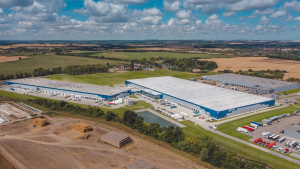
Real estate advisory firm Savills presents a preliminary summary of 2021 and predicts trends for the coming months. The commercial real estate market in Poland is regaining momentum but has changed significantly, reveals Savills. Key trends expected to dominate in the year ahead include rental growth, increasing ESG awareness and a focus on innovation.
As expected, the vaccine roll-out has had a positive impact on the commercial property market in 2021. With investors remaining active, this year’s investment is likely to hit €5 billion. Savills expects recent investment trends to continue and industrial assets to account for close to half of the total transaction volume by the end of the year.
“Although the real estate market has undoubtedly bounced back in 2021, it has remained mired in uncertainty. In addition to concerns about the course of the pandemic, there were also geopolitical and economic risks. This did not however prevent tenants and investors from gradually resuming activity. Key metrics for the past 12 months illustrating investment volumes and office take-up are likely to remain close to last year’s levels amid a positive outlook for the future. A bright exception is the warehouse sector, which - undeterred by the pandemic - is already setting new highs. The commercial real estate market has adjusted to the new reality and is beginning to return to form,” says Tomasz Buras, CEO, Savills Poland.
2021 was the year of searching for an optimal work model on the office market. Many tenants decided to introduce a permanent hybrid scheme combining in-office work and working from home. According to Savills data, Poland’s total office stock topped 12,315,000 sq m. Flexible offices continued to gain traction with flexible office providers shifting their focus to expansion in regional cities.
The Build-to-Rent (multifamily) sector is gradually gaining ground on the Polish market. According to Savills, at the end of 2021 there were close to 40 BtR developments in Poland. Projects that are currently under construction will soon double the stock of rental apartments.
As high-tech and e-commerce companies continue to enjoy brisk expansion, these sectors are seeing their headcount grow. According to Savills, even though this has not translated directly into more demand for offices yet, there will be a growing requirement for modern housing as the trend of hybrid working intensifies.
The online penetration rate (share of total retail sales) has risen from around 5% pre-pandemic to close to 9% in 2021. The development of omnichannel strategies combining online and offline shopping has gathered pace. The growth of e-commerce remains one of the key drivers of demand for logistics space. Retail has also seen the rise of dark stores - small in-town distribution centres helping shorten delivery times. In 2021, this format was launched in Poland, among others, by Żabka. Such platforms are also operated by Lisek, Jokr and Swyft, while Biedronka has teamed up with Glovo.
According to Savills, 2022 is expected to see another spike in construction costs and land prices, as well as upward pressure on wages amid a risk of rising inflation. This will, first of all, push service charges up. Tenants will also be affected by exchange rate differences as euro-denominated rents remain a market standard. In addition, 2022 is likely to be the first year in many to witness warehouse and office rental rates go up.
“There is potential for the investment market to see more buying in 2022. Investor demand for industrial assets will remain strong while the PRS will increase its market share. Several spectacular office projects are likely to change hands. Next year’s investment volume is expected to come close to pre-pandemic levels. Commercial real estate is considered a safe haven in times of high volatility on currency, stock exchange and bond markets, driving investor activity,” adds Tomasz Buras, Savills Poland.
Next year is also shaping up to be a time when ESG strategies will begin to gain prominence in the real estate market. The importance of ESG is rising as a result of the European Union’s taxonomy, or the change of regulations on non-financial sustainability reporting and the entry into force of the CSRD, as well as tenants’ preferences. ESG is not only about a concern for the environment, but also for the human being. According to Savills, this will be visible on the warehouse market, where developers wanting to stand out will also begin to focus on the second social pillar of ESG, i.e. the human aspect, in addition to investing in energy efficiency.
On the office market, there will be marked differences between ESG compliant buildings and those whose owners will fail to take action in this period of change. Today, both older office buildings and properties in non-central locations are faced with refinancing challenges. Prospective buyers are, however, beginning to look for existing buildings with an intention to upgrade or sometimes repurpose them, or even to pull them down. This is true not only for office assets. Warehouse developers have also become keener to engage in brownfield projects in order to secure good locations.
A dichotomy or division of properties into buildings that may soon have to be repurposed for lack of other options and those that have been upgraded will become visible for example in Warsaw’s Służewiec district. Office buildings in that area meeting high standards will be able to attract cost-sensitive tenants with an opportunity to bring rents down. Such buildings may, therefore, become the big winners of the pandemic, says Savills.
In 2022, the Warsaw office market is likely to begin to slowly switch to a landlord’s market. The office development pipeline is currently at its lowest in 10 years. Savills forecasts that as office buildings whose construction began before the pandemic are gradually filling up with tenants, the second half of the year may see the first signs of an undersupply and landlords gaining the upper hand in negotiations. This trend is already apparent in prime office buildings in Warsaw.
Another top trend for 2022 according to Savills is innovation comprising the implementation of new technologies in real estate (proptech) and the use of big data in property management. The drive towards more automation is expected in manufacturing facilities, office buildings and autonomous retail stores. Looking ahead, modern data analytics tools will be used for a growing number of tasks in property management and valuation.



